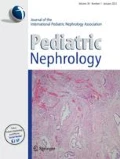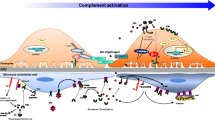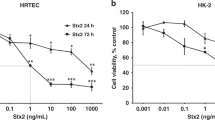Abstract
Acute renal failure hallmarks the pathogenesis of the epidemic form of hemolytic uremic syndrome (D+HUS), which is caused by E. coli strains that produce Shiga-like toxin (Stx). In this study, we investigated the influence of Stx-1 on nitric oxide (NO) production by human glomerular microvascular endothelial cells (GMVEC) and human mesangial cells. NO synthesis by human mesangial cells is in the micromolar range and that of GMVEC in the picomolar range. Stx-1 reduced NO production in non-stimulated GMVEC (5 nmol/l Stx-1 required) without inhibition of protein synthesis. In non-stimulated and TNFα-pretreated mesangial cells, NO production was reduced with a maximal reduction at 10 fmol/l shiga toxin. The cellular iNOS antigen content in mesangial cells was reduced in a concentration-dependent way (10 fmol/l-100 pmol/l), while partial inhibition of protein synthesis required 10 nmol/l Stx-1 in these cells. Our in vitro data suggest that Stx may reduce NO synthesis during the course of HUS development, contributing to the aggravation of the thrombotic microangiopathy and renal failure as observed in HUS.





Similar content being viewed by others
References
Fong JS, de Chadarevian JP, Kaplan BS (1982) Hemolytic-uremic syndrome. Current concepts and management. Pediatr Clin North Am 29:835–856
Remuzzi G, Ruggenenti P (1995) The hemolytic uremic syndrome. Kidney Int 48:2–19
Siegler RL (1995) The hemolytic uremic syndrome. Pediatr Clin North Am 42:1505–1529
Inward CD, Howie AJ, Fitzpatrick MM, Rafaat F, Milford DV, Taylor CM (1997) Renal histopathology in fatal cases of diarrhoea-associated haemolytic uraemic syndrome. British Association for Paediatric Nephrology. Pediatr Nephrol 11:556–559
Karmali MA, Petric M, Lim C, Fleming PC, Arbus GS, Lior H (1985) The association between idiopathic hemolytic uremic syndrome and infection by verotoxin-producing Escherichia coli. J Infect Dis 151:775–782
van de Kar NC, Monnens LA, Karmali MA, van Hinsbergh VW (1992) Tumor necrosis factor and interleukin-1 induce expression of the verocytotoxin receptor globotriaosylceramide on human endothelial cells: implications for the pathogenesis of the hemolytic uremic syndrome. Blood 80:2755–2764
van Setten PA, van Hinsbergh VW, van der Velden TJ, van de Kar NC, Vermeer M, Mahan JD, Assmann KJ, van den Heuvel LP, Monnens LA (1997) Effects of TNF alpha on verocytotoxin cytotoxicity in purified human glomerular microvascular endothelial cells. Kidney Int 51:1245–1256
Obrig TG, Louise CH, Lingwood CA, Boyd B, Barley-Maloney L, Daniel TO (1993) Endothelial heterogeneity in Shiga toxin receptors and responses. J Biol Chem 268:15484–15488
Lord JM, Roberts LM (1998) Toxin entry: retrograde transport through the secretory pathway. J Cell Biol 140:733–736
Sandvig K, van Deurs B (1996) Endocytosis, intracellular transport, and cytotoxic action of Shiga toxin and ricin. Physiol Rev 76:949–966
van Setten PA, van Hinsbergh VW, van den Heuvel LP, van der Velden TJ, van de Kar NC, Krebbers RJ, Karmali MA, Monnens LA (1997) Verocytotoxin inhibits mitogenesis and protein synthesis in purified human glomerular mesangial cells without affecting cell viability: evidence for two distinct mechanisms. J Am Soc Nephrol 8:1877–1888
Bitzan MM, Wang Y, Lin J, Marsden PA (1998) Verotoxin and ricin have novel effects on preproendothelin-1 expression but fail to modify nitric oxide synthase (ecNOS) expression and NO production in vascular endothelium. J Clin Invest 101:372–382
Siegler RL, Pysher TJ, Tesh VL, Noris M, Cassis P, Taylor FB (2005) Reduced nitric oxide bioavailability in a baboon model of Shiga toxin mediated hemolytic uremic syndrome. Ren Failure 27:635–641
Ferrera M, Garvin JL (2005) Recent advances in the regulation of nitric oxide in the kidney. Hypertension 45:1062–1067
Head SC, Karmali MA, Lingwood CA (1991) Preparation of VT1 and VT2 hybrid toxins from their purified dissociated subunits. Evidence for B subunit modulation of a subunit function. J Biol Chem 25 266:3617–3621
Green LC, Wagner DA, Glogowski J, Skipper PL, Wishnok JS, Tannenbaum SR (1982) Analysis of nitrate, nitrite, and [15N]nitrate in biological fluids. Anal Biochem 126:131–138
Lefer AM, Lefer DJ (1996) The role of nitric oxide and cell adhesion molecules on the microcirculation in ischaemia-reperfusion. Cardiovasc Res 32:743–751
De Caterina R, Libby P, Peng HB, Thannickal VJ, Rajavashisth TB, Gimbrone MA Jr, Shin WS, Liao JK (1995) Nitric oxide decreases cytokine-induced endothelial activation. Nitric oxide selectively reduces endothelial expression of adhesion molecules and proinflammatory cytokines. J Clin Invest 96:60–68
Radomski MW, Vallance P, Whitley G, Foxwell N, Moncada S (1993) Platelet adhesion to human vascular endothelium is modulated by constitutive and cytokine induced nitric oxide. Cardiovasc Res 27:1380–1382
van Setten PA, Monnens LA, Verstraten RG, van den Heuvel LP, van Hinsbergh VW (1996) Effects of verocytotoxin-1 on nonadherent human monocytes: binding characteristics, protein synthesis, and induction of cytokine release. Blood 88:174–183
Furusi A, Miyazaki M, Abe K, Tsukasaki S, Shioshita K, Sasaki O, Miyazaki K, Ozono Y, Koji T, Harada T, Sakai H, Kohno S (1998) Expression of endothelial and inducible nitric oxide synthase in human glomerulonephritis. Kidney Int 53:1760–1768
Shao J, Miyata T, Yamada K, Hanafusa N, Wada T, Gordon KL, Inagi R, Kurokawa K, Fujita T, Johnson RJ, Nangaku M (2001) Protective role of nitric oxide in a model of thrombiotic microangiopathy in rats. Kidney Int 12:2088–2097
Minneci PC, Deans KJ, Zhi H, Yuen PS, Star RA, Banks SM, Schechter AN, Natanson C, Gladwin MT, Solomon SB (2005) Hemolysis-associated endothelial dysfunction mediated by accelerated NO activation by decompartmentalized oxyhemoglobin. J Clin Inv 115:3409–3417
Schechter AN, Gladwin MT (2003) Hemoglobin and the paracrine and endocrine functions of nitric oxide. N Eng J Med 348:1483–1485
van Wieringen P (1977) The hemolytic uremic syndrome in childhood, Thesis. p 54, 59
Raij L, Shultz PJ (1993) Endothelium-derived relaxing factor, nitric oxide: effects on and production by mesangial cells and the glomerulus. J Am Soc Nephrol 3:1435–1441
Lopez R, Llinas MT, Roig F, Salazar FJ (2003) Role of nitric oxide and cyclooxygenase-2 in regulating the renal hemodynamic response to norepinephrine. Am J Physiol Regul Integr Comp Physiol 284:R488–R493
Kurtz A, Wagner C (1998) Role of Nitric oxide in the control of renin secretion. Am J Physiol 275:849–862
Benigni A, Remuzzi G (1994) The role of eicosanoids in the pathogenesis of hemolytic uremic syndrome. Prostaglandins Leukot Essent Fatty Acids 51:75–79
Siegler RL, Edwin SS, Christofferson RD, Mitchell MD (1991) Endothelin in the urine of children with the hemolytic uremic syndrome. Pediatrics 88:1063–1066
Goligorsky MS, Iijima K, Krivenko Y, Tsukahara H, Hu Y, Moore LC (1997) Role of mesangial cells in macula densa to afferent arteriole information transfer. Clin Exp Pharmacol Physiol 24:527–531
Acknowledgement
A grant from the Dutch Kidney Foundation supported this investigation: grant 97.1645.
Author information
Authors and Affiliations
Corresponding author
Rights and permissions
About this article
Cite this article
te Loo, D.M., Monnens, L., van der Velden, T. et al. Shiga toxin-1 affects nitric oxide production by human glomerular endothelial and mesangial cells. Pediatr Nephrol 21, 1815–1823 (2006). https://doi.org/10.1007/s00467-006-0232-1
Received:
Revised:
Accepted:
Published:
Issue Date:
DOI: https://doi.org/10.1007/s00467-006-0232-1




